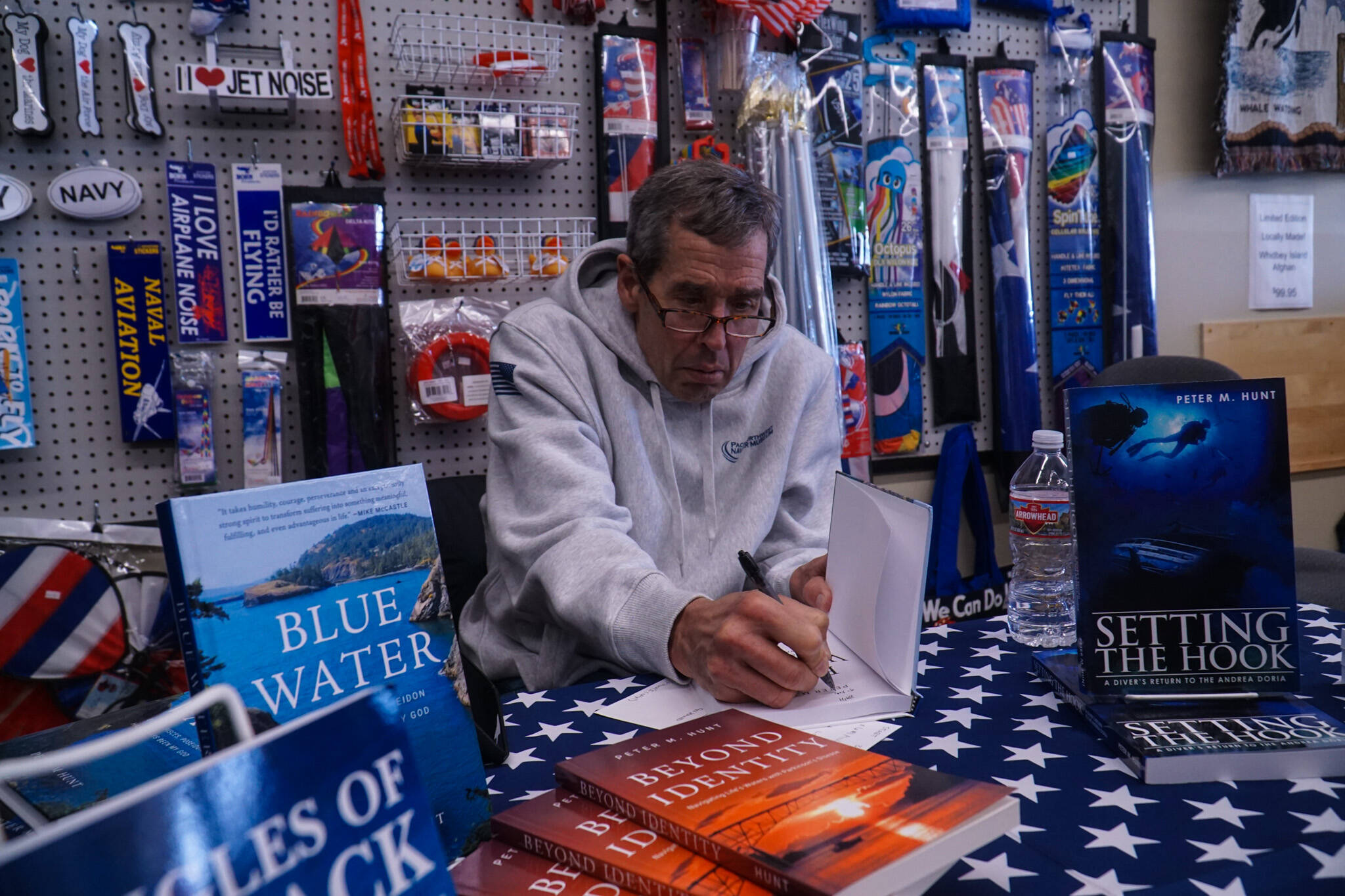From crewing on wreck diving and research vessels in the 1980s, studying history at Brown, flying 45 Desert Storm missions as an A-6 Intruder pilot for the Navy, piloting Boeing 757s, to navigating a 2014 Parkinson’s diagnosis, Whidbey Islander Peter Hunt has lived many profound chapters. His favorite, he said, is his current one: enjoying nature and writing about these experiences.
Hunt is the author of five books of non-fiction. His most recent, “Blue Water,” released in October, compiles about 100 blog posts discovering reasons to smile and meaning in everyday life.
“My point is to try to get people to think, or not to think, if that makes sense,” Hunt said. “There’s nothing there really dramatic, but I think it’s an enjoyable read.”
“Blue Water” can be read straight through or in snippets, he said, even starting at a random page. At Thursday’s book signing at the Pacific Northwest Naval Air Museum, Hunt thumbs to an indiscriminate page and reads the title: “Tribe.”
“In today’s world, the pendulum of truth swings viciously through every conceivable color of veracity’s tableau,” he reads. “Perceptions of fundamental reality vary everywhere, corrupting effective communication and eliminating any possibility of compromise.” Then, he looks up from the book. “What did you gather from that?”
Hunt’s first three books are real-life adventures. His last two, while non-fiction, are a bit more introspective and spiritual. This outlook came from the process of writing his third book, “The Lost Intruder,” he said.
Recently diagnosed with Parkinson’s and no longer able to pilot, barely able to dive, Hunt set out to find a missing A-6 Intruder that crashed off Whidbey Island in 1989. Following mostly his own intuition, he did what the Navy was unable to do with advanced sonar systems and submarines: track down the missing aircraft.
Since then, life’s been full of “synchronicities,” he said. Through finding the lost intruder, he completed what the writer Joseph Campbell dubbed a Hero’s Journey, and it made him re-think many stories in life.
Even before these historic experiences, Hunt loved to write, he said. He spent six years of his childhood in Athens, Greece, where he didn’t have a TV and spent his time reading.
The value of his experiences mostly came to him in hindsight, he said. Twenty, 30 years afterward, he would tell stories of the Gulf War to shocked and immersed faces.
But none of these stories compare to his current one, as told in “Blue Water,” he said.
“I wake up every day and just I’m happy to be,” he said. “Life is a miracle, and sometimes it takes approaching the end of a life to really realize that. It’s important, I think, for people to live their lives fully, and that’s what I’m trying to do.”
Hunt still goes on adventures many would consider “stupid” for his age and condition, he said. He takes his boat out by himself all the time through horrendous weather.
“At the end of the day I want to live really, really bad,” he said.
Condition matters not, he said. Mentality prevails.
“It doesn’t matter if you get cured or not. You’re all going to die. This is just a timeframe,” he said. “It’s how you view life. It will determine your overall happiness.”
“Blue Water” will be Hunt’s last compilation book of the sort, he said. He’s ready to return to a full narrative. What that narrative will be, time will tell, but he’ll know when he knows.
In the meantime, the book serves as a reason to stop and reflect.
“In today’s world, in every day’s world, it’s important that we take our time, step back and take inventory of our basic humanity,” he said. “Why are we doing? Why are we believing? Why are we acting on the beliefs that we are? What is the purpose of it? We can all do a lot better if we did that.”



